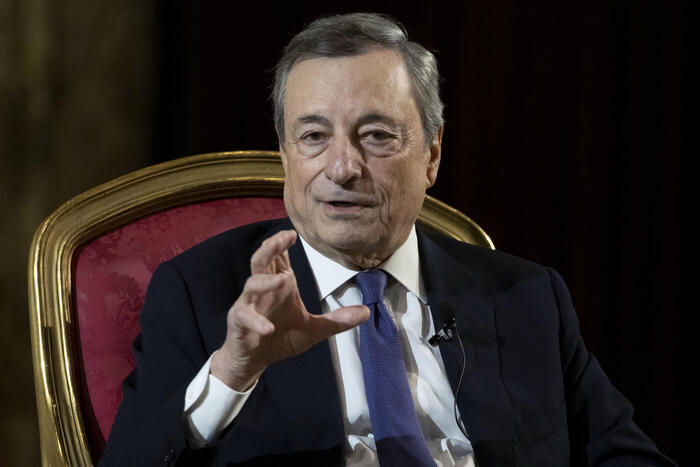Enlarge image
Prime Minister Draghi: What is happening in Italy concerns us all
Photo: Angelo Carconi/EPA
Once a year, governments around the world receive a visit from Washington.
A team of experts from the International Monetary Fund (IMF) then bends over the official figures, interviews officials, calculates, warns and praises.
In the end, a report comes out, a kind of financial policy testimony, including well-intentioned advice.
The Italian government received its verdict a few weeks ago.
In it, the Washington emissaries urge decisive action: Rome needs a "credible dual strategy to get the high deficit and debt ratios under control."
It is about long-term spending discipline and a comprehensive reform program.
In the ideal case, government debt would then fall to 135 percent of economic output in 2030.
135 percent - that would still be a high value, but it would have been preceded by a few steps in the right direction.
Depending on the calculation method, the debt ratio is currently between 150 and 180 percent of gross domestic product (GDP), twice as high as in Germany.
Among the prosperous major economies, Italy is the second most indebted, after Japan.
The situation is pretty hopeless, there is no other way to put it.
So far, the high debt has been manageable because interest rates are extremely low.
But that's about to change.
Funding costs are rising around the world as central banks slam on the brakes to curb rushing inflation and as investors demand higher yields to offset increased risk.
The European Central Bank (ECB) will probably finally start raising interest rates on Thursday.
However, the ECB cannot act as freely as the US Federal Reserve Bank (Fed) in particular.
And that is particularly due to Italy.
The extremely high national debt makes the country vulnerable.
Rapidly rising interest rates could lead to a spiral of debt – and ultimately to a serious economic crisis, possibly in a drift into state bankruptcy.
The seriousness of the situation
Of course, the ECB must take this into account.
To meet the needs of Italy in particular, she is in the process of developing an “anti-fragmentation instrument” – an intervention program with which she wants to prevent interest rates in financially weaker countries from rising to significantly higher levels than those prevailing in Germany or the Netherlands.
So the ECB wants to slow down inflation on the one hand and keep things together on the other.
Whether it can achieve both in reality is an open question.
That is the grim backdrop against which Italy's current government crisis is playing out.
Prime Minister Mario Draghi has offered his resignation, while President Sergio Mattarella has declined.
Now Draghi is expected to appear before Parliament on Wednesday to see if his coalition of national unity is still in place.
One may dismiss this development as part of the political folklore that has unfolded in Italy over the decades.
But this time things are different.
Draghi, the widely respected ex-ECB chief at Palazzo Chigi, has stood between his country and the financial abyss as a confidence-building measure personified.
Under his leadership, Italy would become a more productive, efficient, better managed economy.
Triggered by around 200 billion euros from the Corona development fund (“Next Generation EU”), he should pull through a comprehensive reform and investment program.
The hope: A more productive economy would also make it easier to grow out of debt.
It's all at stake now.
If Draghi leaves because ex-Prime Minister Giuseppe Conte, commander of the remnants of the now divided Five Star Movement, is trying to make a name for himself with ever new demands, then not only will Italy slide into a difficult situation, but the euro zone as a whole.
In the Roman drama that is currently taking place, all the other Europeans are ultimately there as extras.
This much is clear: if Italy, the EU's third-largest economy and one of the most indebted countries in the world, begins to slide, many others will follow.
Gap in the western defense chain
Vladimir Putin could hardly have wished for anything better.
In the middle of the Russian war of conquest against Ukraine, a major euro, NATO and G7 state is in danger of falling into an unparalleled political-economic turmoil.
The inner-coalition opposition is pushing to abandon the resolute transatlantic containment course against Russia, while the Kremlin ruler is expanding his campaign of attrition as a hunger war to the world and as an energy war aimed primarily at Europe.
And Italy, traditionally the weakest of the big, wealthy Western countries, promptly stumbles into a government crisis that could open a breach in the Western front line.
A severe economic crisis, possibly even an Italian state bankruptcy, could undermine the West's entire defense strategy, split the EU and NATO at the same time.
In Moscow one might rub one's hands until they smoke these days.
In this sense, the ECB is the West's first line of defence.
If it manages to keep the rise in Italian interest rates under control, that would – possibly – also help to stabilize the political situation in Italy.
If not, the rating agency Standard & Poor's expects the Italian government's debt service to soar to five and a half percent of GDP, a level at the height of the euro crisis in 2012.
However, at that time the debt ratio was around 50 percentage points lower than today.
It could get really tight this time.
Italy concerns us all
Italy has a lot of structural problems:
According to OECD calculations, productivity is around a quarter lower in comparable western economies.
Employment is also far below the German or French level.
The PISA studies repeatedly show the weaknesses of the education system.
Italy is weak in research and development (R&D), despite solid industrial structures in the north.
The R&D rate in relation to GDP is only half as high as in Germany or France.
The population is aging and shrinking rapidly.
Many younger, well-educated people have migrated to other EU countries, not least to Germany, over the past decade.
The combination of declining population and high debt is tricky.
As long as interest rates were low and the ECB boldly bought up government bonds, the burden was bearable.
What now?
This much is clear: in the end, Italy can only save itself.
The billions from the Corona fund and low interest rates can only serve as a catalyst.
Even the euro bailout fund ESM, which could also be used to ensure Italy's debt sustainability, can only help people to help themselves.
advertisement
Henrik Mueller
Short-cut politics: How permanent outrage destroys our democracy
Publisher: Piper
Number of pages: 256
Publisher: Piper
Number of pages: 256
Buy for €22.00
price inquiry time
07/17/2022 11:03 am
No guarantee
Order from Amazon
Order from Thalia
Order from Weltbild
Product reviews are purely editorial and independent.
Via the so-called affiliate links above, we usually receive a commission from the retailer when you make a purchase.
More information here
Italy could do much more.
It is held back not only by a widespread defeatism that hampers structural reforms, but also by past debts.
In the 1970s and 1980s in particular, Italy tried to resolve its internal political conflicts through spending programs financed on credit.
Debt peaked in the early 1990s.
But then came a reversal.
With a view to joining the euro, the state embarked on a continuous course of consolidation.
The debt ratio gradually decreased.
This remained the case even after Italy joined the monetary union in 1999.
But then the financial, the euro and later the corona crisis messed up the balance sheet.
As elsewhere, the debt ratio has always skyrocketed.
With rising interest rates, the mistakes of the past weigh all the more heavily for current generations.
How the country can free itself from this situation is primarily Italy's national task.
But what is happening in Italy concerns us all, not just the ECB.
The most important economic dates of the coming week
Expand areaMonday
Brussels – EU foreign ministers meeting.
The agenda is packed, from the war in Ukraine to relations with Latin America and the Caribbean to digital diplomacy.
Earnings Season I – Bank of America, Goldman Sachs, IBM financial results.
ExpandareaTuesday
Luxembourg – The EU statistics agency Eurostat will publish details on consumer price inflation in June.
Earnings Season II - Results from Johnson & Johnson, Novartis, Volvo AB.
ExpandareaWednesday
Rome – Prime Minister Draghi goes to the Italian Parliament.
If his coalition maintains national unity, he could remain prime minister.
Otherwise, many scenarios are conceivable, including early elections.
Reporting season III – financial figures Akzo Nobel, Alfa Laval, Volvo Cars, SKF.
Expand areaThursday
Frankfurt –
President Lagarde chairs the Governing Council meeting and then faces the press.
The stakes are high for the central bank governor: will she be able to convince markets and the public that she intends to fight hard to curb inflation?
Reporting Season IV – Results from SAP, ABB, Roche, AT&T, Nokia, Sartorius, Dow, Dassault Aviation, Electrolux, Philip Morris, Snap.
ExpandareaFriday
Brussels – Release of the Eurozone Purchasing Managers' Index, a key leading indicator of the state of the economy.








/cloudfront-eu-central-1.images.arcpublishing.com/prisa/C3LDLHDAXBBCFCHWBPELHN64FU.jpg)